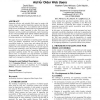Free Online Productivity Tools
i2Speak
i2Symbol
i2OCR
iTex2Img
iWeb2Print
iWeb2Shot
i2Type
iPdf2Split
iPdf2Merge
i2Bopomofo
i2Arabic
i2Style
i2Image
i2PDF
iLatex2Rtf
Sci2ools
149
click to vote
W4A
2010
ACM
2010
ACM
The potential of adaptive interfaces as an accessibility aid for older web users
Supporting effective and enjoyable Web usage by people with sensory, motor and cognitive impairments requires more than just accessible Web content. There is an additional task of matching people with an accessibility solution that best accommodates their particular needs - which, especially for older Web users, may fluctuate in severity, number and combination. Lack of awareness of ones own accessibility needs and the solutions that may exist to accommodate them may lead to a reduced quality Web browsing experience or even abandonment. This paper discusses the difficulties in matching people with less severe, but multiple, impairments with the most appropriate accessibility features at a given time, and explores the role of automated or semi-automated adaptations as a solution for this problem. We review related work, and report on the early stages of our own work conducted to prove the concept of adaptations for accessibility in the specific context of supporting Web users with age-...
Related Content
| Added | 15 Feb 2011 |
| Updated | 15 Feb 2011 |
| Type | Journal |
| Year | 2010 |
| Where | W4A |
| Authors | David Sloan, Matthew T. Atkinson, Colin H. C. Machin, Yunqiu Li |
Comments (0)

